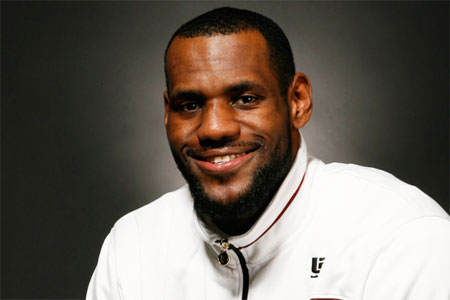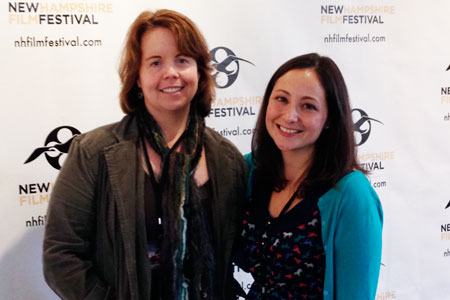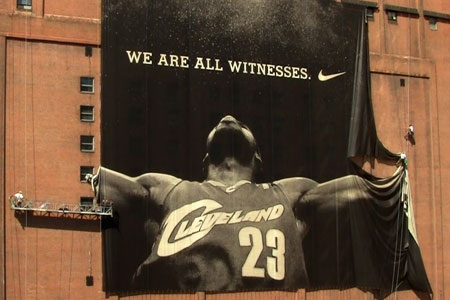LeBron move sparks Emerson filmmakers

NBA star LeBron James' return to Cleveland has spawned Emerson filmmakers behind the 2013 documentary Losing LeBron to film additional footage.
Basketball star LeBron James’ bombshell announcement this month that he is returning to his hometown Cleveland Cavaliers—the team he dumped for the Miami Heat in an astonishing farewell television special many described as arrogant in 2010—has reinvigorated Emerson filmmakers who documented the debacle with the help of Maria Menounos ’00.
“It’s a very exciting time,” said Nicole Prowell Hart, MFA ’13, who last year made the documentary Losing LeBron with Allyson Sherlock, MFA ’12, who is now a part-time faculty member in Emerson’s Visual and Media Arts Department. “We’re both really thrilled.”
Even though Losing LeBron was released last year—and recently became available on iTunes, Amazon, and Google Play, and will be “On Demand” for Comcast, Verizon, and Cox subscribers next month—the pair plan to return to Cleveland this summer to film additional footage and re-release an updated version of the documentary in the next few months.
They also plan to attend the Cavaliers’ first home game of the season this fall.
“It will be the most epic moment in recent Cleveland sports history,” Prowell Hart said.

Allyson Sherlock, MFA '12 and Nicole Prowell Hart, MFA '13, the filmmakers behind Losing LeBron, at the New Hampshire Film Festival last year. (Courtesy Photo)
Menounos, whose nonprofit organization Take Action Hollywood! largely funded Losing LeBron, was executive producer. Prowell Hart and Sherlock met Menounos, star of Chasing Maria Menounos and host of Extra, at the Emerson Film Festival in 2009, and connected with her to make the film about two years later.
Losing LeBron was shown at several film festivals in 2013, and won for Best Editing at Emerson’s It’s All True Festival.
In a city that hasn’t won a professional sports championship in 50 years, the filmmakers say James’ return to Cleveland is momentous.
“A lot of people know he left, but they don’t know why it was such a big deal,” Sherlock said.
Prowell Hart compared James’ 2010 goodbye to “being dumped by your girlfriend or boyfriend on national TV. It was humiliating for the city,” she said, referring to his 75-minute ESPN special announcing his decision to join Miami, where he went on to win two championships.

A scene from Losing LeBron in which an enormous LeBron James poster is removed by workers in Cleveland after the NBA player left the city for Miami in 2010.
Since the July 11 announcement that he was returning to the Cavaliers in an essay on SI.com, Sherlock said there appears to be “immediate forgiveness” in Cleveland—with fans camping outside his house waiting for the big announcement.
“I actually think that’s a good thing,” she said. “How does holding a grudge or being hateful benefit anybody?”
One of those forgiving people is Cavaliers owner Dan Gilbert, who wrote an infamous letter bashing James four years ago, calling his departure a “cowardly betrayal.”
“One interesting thing [James] wrote [in his essay] was that he referred to Miami as his ‘college years,’” said Sherlock. “It’s easy to forget he grew up in the Cleveland area and didn’t have many chances to leave that world before joining the NBA at age 19.”
“He’s a good guy,” she continued. “He’s married, a good father, not in trouble, and donates tons of money. Is he arrogant? Yeah. But I don’t think he’s the jerk people make him out to be.”
Losing LeBron was created as an idea for a class taught by faculty member Linda Reisman of Visual and Media Arts, who encouraged the pair to make the film.
“It all started with a classroom assignment. This was an Emerson project through and through,” Prowell Hart said. “We could not have made this project without Emerson.”
Categories